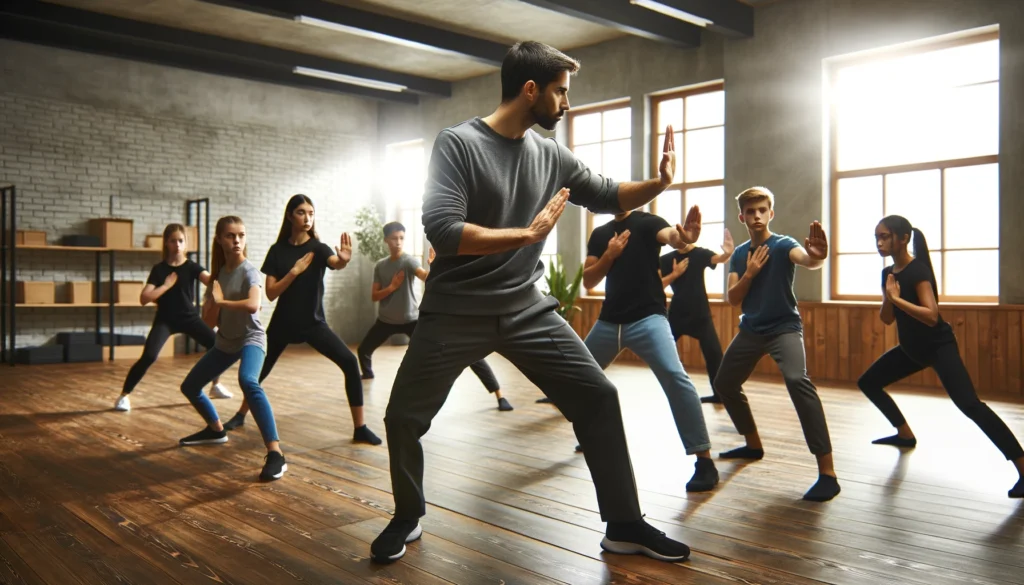
Try this lesson: Navigating Self-Defense Principles
Self-defense refers to the actions taken by an individual to prevent harm to themselves or others when faced with immediate danger. It encompasses a range of techniques and strategies, from physical maneuvers to de-escalation tactics, tailored to counter various threats. Learning self-defense can significantly enhance one’s confidence and safety, providing valuable skills to navigate potentially harmful situations.
Table of Contents
A2 Level Questions:
- What is self-defense?
- Why should people learn self-defense?
- Can you name any self-defense techniques?
- Should self-defense be taught in schools?
- Is self-defense important for everyone?
- What is the best way to avoid a fight?
- Can self-defense be used to protect others?
- How can someone learn self-defense?
- Are there self-defense classes for children?
- What should you do if you see someone else being attacked?
- Is it legal to defend yourself in all countries?
- Can self-defense skills increase your confidence?
- Should self-defense include learning how to call for help?
- What kind of equipment is used in self-defense training?
- Is running away a good self-defense strategy?
- How often should you practice self-defense techniques?
- Can self-defense be dangerous?
- What is the difference between self-defense and fighting?
- Should elderly people learn self-defense?
- Can self-defense techniques be different for men and women?
B1 Level Questions:
- How does learning self-defense impact a person’s mental health?
- What are the ethical considerations of using self-defense?
- How can self-defense techniques be adapted for people with disabilities?
- Discuss the role of awareness in self-defense.
- How effective are non-physical self-defense strategies?
- What is the importance of de-escalation in self-defense?
- Can self-defense techniques vary based on cultural contexts?
- How do self-defense classes simulate real-life scenarios?
- Discuss the psychological benefits of knowing self-defense.
- Should self-defense training include first aid skills?
- How can technology be used in self-defense?
- What are the limitations of self-defense laws?
- How do gender stereotypes affect self-defense training?
- Can self-defense prevent bullying?
- What is the role of fitness in self-defense?
- How to choose a self-defense class that suits you?
- Discuss the history of martial arts as self-defense.
- How does self-defense differ from martial arts?
- What are some common misconceptions about self-defense?
- How can self-defense training be made more accessible to everyone?
B2 Level Questions:
- Analyze the psychological effects of experiencing an attack and how self-defense training can mitigate these impacts.
- Discuss the balance between aggression and self-control in self-defense.
- Explore the concept of reasonable force in the context of self-defense laws.
- Evaluate the role of self-defense in empowering women and vulnerable populations.
- How does the media portray self-defense, and what impact does this have on public perception?
- What are the ethical implications of teaching children aggressive self-defense techniques?
- Discuss how cultural differences influence self-defense practices and perceptions.
- Analyze the effectiveness of self-defense gadgets and tools in real-life situations.
- How can self-defense training contribute to community safety?
- What strategies can be employed to de-escalate potentially dangerous situations without physical confrontation?
- Discuss the importance of situational awareness in self-defense.
- How do self-defense courses address the fear of being attacked?
- Explore the relationship between self-defense and personal responsibility.
- What are the challenges of implementing self-defense training in educational systems?
- How does self-confidence play a role in self-defense?
- Evaluate the ethical and moral responsibilities of using self-defense.
- Discuss the integration of self-defense training into daily life.
- How has the approach to self-defense evolved over time?
- What role does intuition play in self-defense?
- Analyze the impact of social media on self-defense awareness and education.
C1 Level Questions:
- Critically evaluate the argument that self-defense training may encourage violence.
- Discuss the legal and moral complexities of using deadly force in self-defense situations.
- Explore the psychological preparedness required for effective self-defense.
- How do societal attitudes towards self-defense vary globally, and what are the implications of these differences?
- Analyze the intersection of self-defense and human rights.
- Evaluate the effectiveness of different martial arts styles as forms of self-defense.
- Discuss the role of gender in self-defense strategies and training.
- Explore the potential of virtual reality (VR) in self-defense training.
- How does self-defense education impact the perception of personal security and safety?
- Examine the influence of self-defense training on physical and psychological resilience.
C2 Level Questions:
- Debate the ethical implications of preemptive self-defense actions.
- Analyze the role of self-defense in the context of global security concerns.
- Discuss the philosophical underpinnings of the right to self-defense.
- Evaluate the impact of cultural and legal frameworks on the practice and perception of self-defense.
- Explore the potential conflicts between self-defense training and pacifist ideologies.
- Critically assess the role of improvisation in self-defense situations.
- Examine the psychological effects of long-term self-defense training.
- Analyze the effectiveness of self-defense strategies in reducing crime rates.
- Discuss the limitations of self-defense in addressing systemic violence.
- Explore the role of empathy and understanding in conflict resolution and self-defense strategies.

